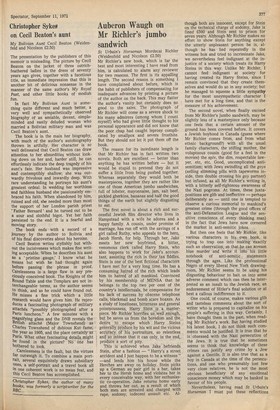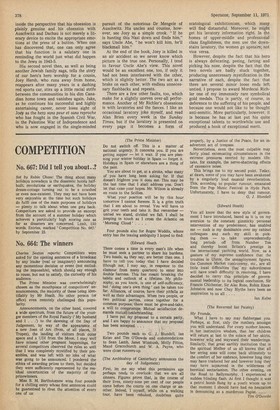Auberon Waugh on Mr Richler's jumbo sandwich
St Urbain's Horseman Mordecai Richler (Weidenfeld and Nicolson £2.50) Mr Richler's new book, which is far the best and most interesting I have read from him, is calculated to alarm any reviewer for two reasons. The first is its appalling length. The second reason is something I have complained about before, which is the habit of publishers of compensating for inadequate advances by printing a picture of the author on the back. This may flatter the author's vanity but certainly does no good to the sales. The photograph of Mr Richler will come as a severe shock to his many admirers (among whom I count myself) who had given little thought to his personal appearance and did not know that the poor chap had caught leprosy complicated by smallpox and severe frostbite. But they should not let it put them off the book.
The reason for its inordinate length is that Mr Richler has in fact written two novels. Both are excellent — better than anything he has written before — but it would be stupid to pretend they do not suffer a little from being pushed together.
Whereas separately they would both be masterpieces, together they are rather like one of those American jumbo sandwiches, full of lobster, mayonnaise, jam, salt beef, pickled gherkins, bananas and half the good things of the earth but slightly disgusting to eat.
The first novel is about a rich and successful Jewish film director who lives in Hampstead with a wife he adores and a happy family. A cousin, under promise of marriage, has run off with the savings of a girl called Ruthy, who appeals to the hero, Jacob Hersh, for help. Through her, Jake meets her new boyfriend, a bitter, venomous clerk called Harry Stein, who also happens to work for Jake's accountant, assisting the rich in their, tax fiddles.
Stein is one of the best fictional characters I have met for a very long time. He has a consuming hatred of the rich which leads him to hatred of all mankind. Convinced by his membership of MENSA that he belongs to the top two per cent of the country's intellectuals, he compensates for his lack of success by obscene telephone calls, blackmail and bomb scare hoaxes. As a study of loneliness, bitterness and general pois000usness, Harry Stein is a masterpiece. Mr Richler horrifies us well ,enough, but he saves us from the boredom and the desire to escape which Harry Steins generally produce by his wit and the vicious accuracy of his portraiture, so relentless ; and so intense that it can only, in the end, produce a sort of pity.
This is achieved when Jake befriends Stein, after a fashion — "Harry's a street accident and I just happen to be a witness" —and lends him his house while the Herches are away on holiday. Stein picks up a German au pair girl in a bar, takes her to the Hersh home and violates her in every conceivable way, with her enthusias tic co-operation. Jake returns home early and throws her out, as a result of which both men are arrested and charged with rape, sodomy, indecent assault etc. Al though both are innocent, except for Stein on the technical charge of sodomy, Jake is fined £500 and Stein sent to prison for seven years. Although Mr Richler makes no effort to show Stein for anything except the utterly unpleasant person he is, although he has lied repeatedly in the witness box and tried to incriminate Jake, we nevertheless feel indignant at the injustice of a society which treats its Harry Steins in this way. Unlike Mr Richler, I cannot feel indignant at society for having created its Harry Steins, since I remain convinced that they create themselves and would do so in any society; but he managed to squeeze a little sympathy for the most unsympathetic character I have met for a long time, and that is the measure of his achievement.
The second novel, when finally excised from Mr Richler's jumbo sandwich, may be slightly less of a masterpiece only because one feels that a certain amount of the ground has been covered before. It covers a Jewish boyhood in Canada (guess where Mr Richler comes from, and from what ethnic background?) with all the usual family characters, the stifling mother, the voluptuous cousin (good for a feel in the movies) the spiv, the dim, respectable lawyer, etc, etc. Good, uncomplicated antisemitism; with Jews swindling all the goys (selling slimming pills with tapeworms inside, then double crossing his goy partner) but infused, as all Mr Richler's writing is, with a bitterly self-righteous awareness of the Nazi pogroms. At times, these juxtapositions are glib and ineffective — perhaps deliberately so — until one is tempted to observe a curious memorial to mankind's greatest crime (through the good offices of the anti-Defamation League and the sensitive conscience of every thinking man) in the fact that Jews have now cornered the market in anti-semitic jokes.
But then one feels that Mr Richler, like various characters in his own book, is trying to trap one into making exactly such an observation, so that he can scream blue murder and write it into his little notebook of anti-semitic statements through the ages. Like the professional Negro of every liberal New York drawingroom, Mr Richler seems to be using his disgusting behaviour to bait us into some adverse comment which can then be interpreted as an insult to the Jewish race, an endorsement of Hitler's final solution or at best a callous indifference to it.
One could, of course, makes various glib and tasteless comments about the sort of writer who is prepared to capitalize on his people's suffering in this way. Certainly, I have thought them in the past, when reading Mr Richler's work. But having studied his latest book, I do not think such comments would be justified. It is true that he is obsessed with the Nazi persecution of the Jews. It is true that he sometimes seems to think that knowledge of these crimes can justify any crime by a Jew against a Gentile. It is also true that as a boy in Canada at the time of the persecu tions, and one who presumably lost few very close relatives, he is not the most obvious beneficiary of any emotional conscience money which may be banked in favour of his people.
Nevertheless, having read St Urbain's Horseman I must put these reflections
inside the perspective that his obsession is plainly genuine and his obsession with Auschwitz and Dachau is not merely a literary device to excite the appropriate emotions at the press of a button. When one has discovered that, one can only agree that his function is a salutary one in reminding the world just what did happen to the Jews in 1943-5.
His second novel then, as well as being another Jewish family saga, tells the story of our hero's hero worship for a cousin, Joey Hersh, who runs away from home, reappears after many years in a dashing red sports car, stirs up a little racial strife between the communities in his dim Canadian home town and vanishes again. Jake, as he continues his successful and highly entertaining career, never loses sight of Jo* as the hero sans peur at sans reproche who has fought in the Spanish Civil War, in the Palestine War of Independence and who is now engaged in the single-minded pursuit of the notorious Dr Mengele of Auschwitz. His uncles and cousins, however, see Joey as a simple crook. "If he is hunting this Nazi down and finds him," says Uncle Abe, "he won't kill him, he'll blackmail him."
At the end of the book, Joey is killed in an air accident so we never know which picture is the true one. Personally, I tend to favour Uncle Abe's view. This novel would be an excellent one, too, if only it had not been interleaved with the other, which is slightly better. The two act as a brake on each other, with endless unneeessary flashbacks and repeats.
There are a few other faults, too, which make for a slightly uneven over-all performance. Another of Mr Richler's obsessions is with lavatories and the faeces. I like an occasional lavatory joke myself, and read Alan Brien every week in the Sunday Times, but if the lavatory is presented on every page it becomes a form of
scatological exhibitionism, which many will find distasteful. Moreover, he might get his lavatory information right. In the homes of upper-middle and professional class Englishmen, the men use the downstairs lavatory, the women go upstairs; not vice versa.
However, despite the fact that his hero is always defecating, peeing, farting and picking his nose, despite the fact that the two novels are badly stuck together, producing unnecessary mystification in the narrative of each, despite the fact that there are several minor loose ends left untied, I propose to award Mordecai Richler one of my immensely rare symbolical gold medals. This is partly, of course, in deference to the suffering of his people, and because one would not like to be thought anti-semitic, More particularly, however, it is because he has at last put his quite exceptional talents to worthwhile use and produced a book of exceptional merit.











































 Previous page
Previous page